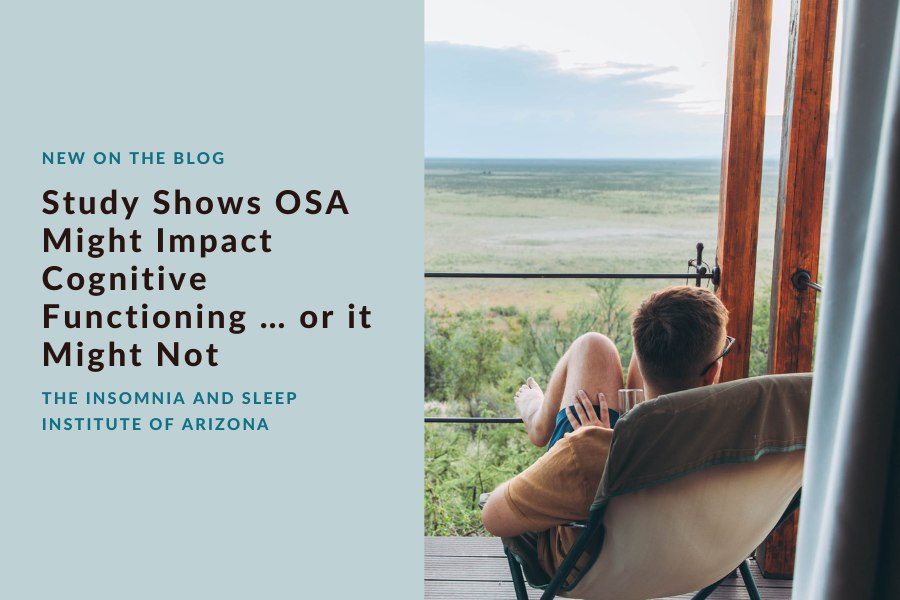Disorders and diseases are challenging because there’s not a one size fits all profile or solution for them. That’s why The Insomnia and Sleep Institute of Arizona customizes treatment/management plans for every patient. Recently, a study presented at the European Respiratory Society International Congress showed that obstructive sleep apnea (OSA) can worsen certain kinds of cognitive functions in elderly patients. Specifically, these patients were 74+ years old and mostly men. However, at the same time, the study revealed that other cognitive functions weren’t much affected by sleep apnea. In total, patients were analyzed between 2003 – 2008, and follow-up occurred every five years.
There were 358 participants, all of whom took sleep tests to determine their OSA and severity at the onset of the study. The first follow-up, which occurred in 2009 – 2013, analyzed mental processing skills and they were also tested on a different cognitive assessment at the second follow-up study. These cognitive tests took a look at reasoning and knowledge skills, their processing speed, verbal memory, visual perception of spatial relationships, and language. According to the lead author, “We found that OSA and, in particular, low oxygen levels during sleep due to OSA, was associated with a greater decline in global cognitive function, processing speed, executive function, and verbal memory.” Those at the highest risk were men over 74 years old, especially in some cognitive tests like the Stroop test.
Testing for OSA Symptoms
The Stroop test measures executive function and processing speed. It also considers verbal fluency, but the researchers found that only men (not women) 74+ declined in this area. According to the researchers, “This study demonstrates that the severity of sleep apnea and night-time oxygen deprivation contribute to cognitive decline in old age.” Of course, older people are also more likely to develop and be diagnosed with OSA—but they are also of the demographic more likely to not comply with CPAP best practices. This can be for a number of reasons for users of all ages, but in the elderly there is the added issue of sensitive and thinner skin making ill-fitting CPAP accessories too bothersome.
The researchers noted that their findings “also shows that sleep apnea is related to a decline in specific cognitive functions … but not to a decline in all cognitive functions; for instance, language and visuospatial function were not affected.” During the presentations, the researchers stressed that those with OSA as well as their doctors need to know how OSA and cognitive decline associate with one another. Of course, sleep doctors know, but not everyone with OSA regularly sees their sleep doctor (though they should). This means educating GPs and other non-sleep doctors is critical.
CPAP and Cognitive Decline
Even though CPAP is the standard therapy for OSA patients, the researchers found that “OSA treatment with CPAP has not been clearly demonstrated to prevent cognitive decline.” However, not everyone is at the same risk of cognitive decline, though it may become a factor for more people as the population ages. “There is probably a subgroup of patients, particularly those with greater nocturnal oxygen deprivation but also older patients and men, who could be at greater risk of OSA-related cognitive decline,” says the research team.
Currently, they are planning to analyze more data on OSA after ten years to better determine who the highest risk factor groups are. A randomized control trial seems to be the best approach right now so that the effectiveness of CPAP on cognition can receive the attention it needs. The study had many strong suits, including following several people over the years, and polysomnography (the gold standard in testing) was used as well as a myriad of other cognitive tests. However, all participants were relatively healthy and did not have severe dementia or cognitive impairment.
If you have OSA or suspect you have OSA, the first step is a consultation with a sleep expert who can diagnose sleep disorders. CPAP is the requisite first step, and often final step, for those with OSA. There are a rare few who do not do well with CPAP therapy, in which case alternatives like implants may be considered. To schedule your consultation with The Insomnia and Sleep Institute, call the clinic or complete the online form today.





